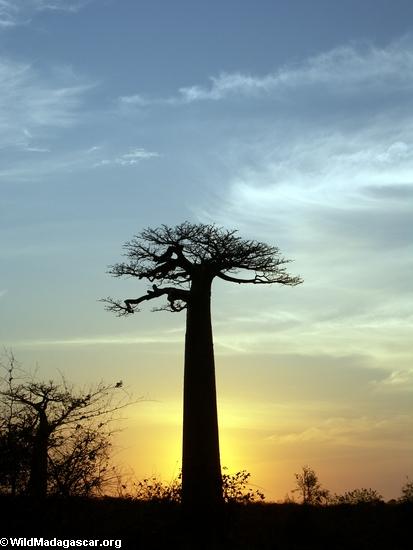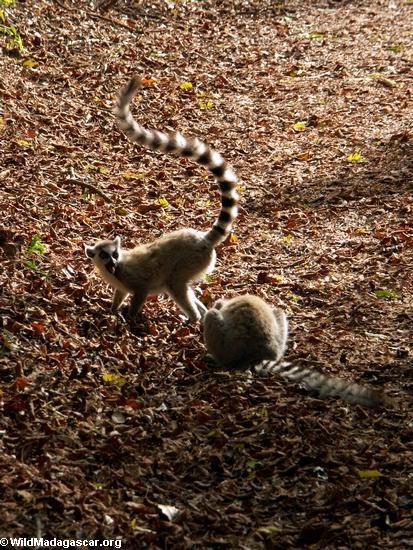Madagascar looks toward a brighter economic future with movie, new aid package
Rhett Butler, mongabay.com
April 18, 2005
 Baobab tree in Madagascar |
|
The planet’s most biologically diverse island is also one of the poorest countries in the world.
Madagascar, the world’s fourth largest island at about size the size of Texas or France, has an average per capita income of $260 among its 18 million people. About 70 percent of its population lives below the poverty line while nearly half of its children under five years of age are malnourished. In the past three years the country has nearly experienced a civil war and seen the agricultural based economy hit rock bottom during the political turmoil of the past presidential election. Nevertheless Madagascar may well be on its way to a brighter economic future thanks to a blockbuster animated movie, an innovative new aid program, and the capable leadership of the new president.
Madagascar is one of the more isolated countries on Earth. It sits in the Indian Ocean off the coast of southern Africa from which it has been separated for over 160 million years. Due to this isolation, about 70% of the estimates 250,000 species found on the island exist nowhere else on the globe. The island is home to such evolutionary oddities as lemurs, a group of primates endemic to the island; brilliantly colored lizards including geckos and chameleons; tenrecs, spiny hedgehog-like creatures; and the fossa, a carnivorous animal that looks like a cross between a puma and a dog but is closely related to the mongoose. This assemblage of peculiar and unique animals has made Madagascar a top conservation priority for years but due to the country’s poverty, many of these animals are today quite rare and threatened with extinction. It is just this biological diversity that has made Madagascar the setting for a new film to be released by Dreamworks in May 2005.
Film brings hope
Dreamworks’ Madagascar is one of the most anticipated films of this spring. The computer-animated film tells the story of four urbanite zoo-dwelling animals who escape from New York and experience culture shock when they arrive in a vastly foreign and decidedly wild Madagascar. The movie features voice performances by Jada Pinkett Smith, Chris Rock, David Schwimmer and Ben Stiller and carries a sizeable marketing budget. According to Dreamworks’ CEO Jeffrey Katzenberg, the film has test screened better than blockbuster hit Shrek, which demolished box office records when it was released in 2001. Shrek 2, the sequel, did even better in 2004.
Madagascar, the country, hopes the film will stimulate its tourist industry in a way similar to Kenya’s after the 1985 film Out of Africa was released. Out of Africa, a popular film starring Meryl Streep and Robert Redford, was filmed in Kenya and brought a massive increase in tourism in the five following years. While Madagascar currently receives few American tourists, the film is expected to dramatically raise the profile of the country and add interest in the burgeoning ecotourism sector.
Ecotourism: the future of Madagascar?
 Ring-tailed lemurs in Madagascar |
|
Ecotourism may be the best hope for Madagascar to improve the standard of living for its people and indeed ecotourism is growing in the country: according to Hilary Bradt’s guide to Madagascar around 50% of visitors to Madagascar now visit a protected area when they come to the country (up from 20% in 1995).
Responsibly managed ecotourism can generate substantial amounts of revenue and employ large numbers of local people without causing significant environmental damage. And because ecotourists pay to see a country’s natural beauty it gives local people a direct incentive to conserve the environment around them. In Madagascar local communities benefit directly from ecotourism through their 50% share of park entrance fees (park entry fees are divided equally between the parks service and local communities), sales of handicrafts and “tourist items,” and employment as porters, wildlife guides, park rangers, workers in the service force of hotels, restaurants and lodges. Ecotourism has great potential to diversify Madagascar’s economy beyond its current limited number of agricultural and mineral exports.
Madagascar, the test case for a new American aid initiative
Madagascar’s agricultural-based economy has long lagged behind that of other southern African and Indian Ocean nations due, in a large part, to severe environmental degradation that has ruined the country’s soils and agricultural promise. Today Madagascar relies heavily on foreign aid to supplement its income from exports like gems, vanilla, spices, and wildlife products.
In March 2005, Madagascar became the first recipient of aid under the new Millennium Challenge Account, a US Aid program that gives grants to countries committed to respecting the rule of law and reducing corruption. The $110 million, four-year aid package was officially signed on April 18, 2005 in Washington, D.C. by Madagascar’s president Marc Ravalomanana who has had much to do with the country’s recent turn around.
Malagasy president Marc Ravalomanana
President Marc Ravalomanana is a man of humble origins. Educated by missionaries in his village of Imerikasina, 25 kilometers outside the capital city of Antananarivo (“Tana”), Ravalomanana started his business career producing home made yogurt which he sold on the streets of Tana off the back of his bicycle. Rising to become Madagascar’s richest man, Ravalomanana focused on politics and won the seat of mayor of Tana before winning the contested presidential election of 2002. The ensuing political crisis, which saw two rival presidents set up their own governments, resulted in an economic collapse for Madagascar from which the country is still recovering. Despite his rocky start, Ravalomanana has made considerable progress improving the economy and establishing foreign business relationships. Now that he has the backing of the Millennium Challenge Account aid package Ravalomanana will have an impetus for battling corruption and improving the quality of life for the people of Madagascar, the Malagasy.
For once the optimism of the eternally optimistic Malagasy may be well grounded as a new day dawns for Madagascar.
Related links:
-
Madagascar – The biological and cultural diversity of Madagascar
Madagascar photos – Images of Madagascar
In Search of the Aye-aye – Seeking the world’s strangest primate on a tropical island paradise off Madagascar
Madagascar Larger Than Life, New Life for Madagascar’s Tourist Industry? – Will new movie grow Madagascar’s economy?